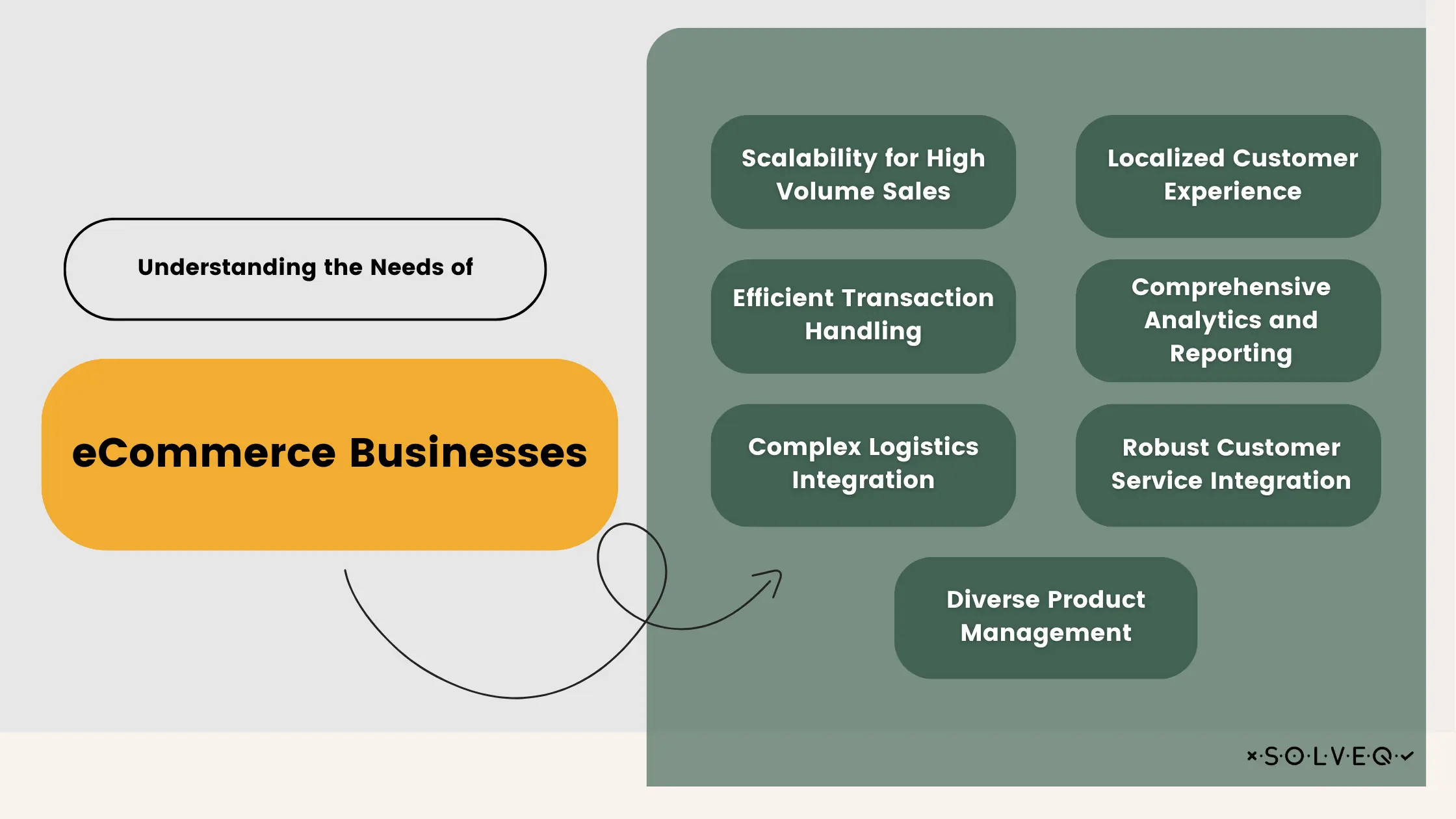Building Your Online Empire: Is Shopify or a Custom Solution the Right Choice for You
28 Mar 2024 • 34 min read

Marcin Kulawik

In the quest to build a thriving online empire, one of the most critical decisions a business faces is choosing the right eCommerce platform. This choice is particularly crucial for larger companies, where factors like scalability, robustness, and global reach are paramount. With options ranging from versatile platforms like Shopify to highly customized solutions, this decision shapes a business's ability to adapt, grow, and succeed in the competitive digital marketplace. As we delve into this article, we'll explore the nuances of this choice and its impact on businesses poised for significant growth.
Understanding the Needs of eCommerce Businesses
In navigating the complexities of eCommerce, larger businesses encounter a distinct set of challenges. It's vital for these entities to pick a platform that aligns seamlessly with their expansive and intricate needs, be it Shopify or a custom solution. Understanding these needs is key to their online success. Here are the critical areas they must consider:

- Scalability for High Volume Sales: It's essential for these platforms to handle surges in traffic and sales efficiently, especially during peak seasons. The system must scale effortlessly to accommodate a sudden influx of customers without compromising performance.
- Efficient Transaction Handling: With the sheer volume of transactions, security, speed, and efficiency in processing are non-negotiable features. This ensures smooth operations and builds trust with customers.
- Complex Logistics Integration: For companies with a global footprint, managing intricate shipping logistics becomes paramount. This includes navigating international shipping regulations, customs, and real-time inventory tracking across multiple locations.
- Diverse Product Management: A platform must offer the flexibility to easily manage a wide array of products, including adding, removing, and modifying items, as well as supporting multiple product variants and customizations.
- Localized Customer Experience: To appeal to a global audience, the platform should support multi-language and currency options, and tailor the shopping experience to regional trends, preferences, and legalities.
- Comprehensive Analytics and Reporting: Access to advanced analytics and the ability to generate custom reports is critical. These tools help in understanding customer behaviors, tracking performance, and making data-driven decisions.
- Robust Customer Service Integration: This includes offering support across various channels like email, chat, and phone, as well as effective CRM integration for personalized service and maintaining high customer satisfaction.
For larger eCommerce companies, addressing these specific needs is crucial for the efficient management and scaling of their operations. The choice between Shopify and a custom solution heavily relies on how these platforms cater to these varied and complex requirements.
Cost Comparison
When evaluating whether to go with Shopify or a custom solution for your eCommerce platform, cost plays a significant role. Both options present different financial considerations, particularly regarding initial setup, maintenance, and scalability.

Initial Setup Costs:
- Custom Solutions: Embarking on a custom-built eCommerce platform often involves a substantial initial investment. This is due to the development costs, which include hiring developers, designing the user interface, and tailoring features to specific needs. While this might seem steep at the outset, it's a one-time expense tailored to the precise requirements of the business.
- Shopify: In contrast, Shopify operates on a subscription-based model. This means lower upfront costs since Shopify offers various plans to accommodate different business sizes. The ease of setup and a plethora of ready-to-use templates significantly reduce the initial investment and technical expertise required.
Maintenance Costs:
- Shopify: One of the advantages of using Shopify is that it handles updates and maintenance. Since Shopify is responsible for the technical upkeep of the platform, this can significantly lower long-term costs and reduce the need for an in-house technical team.
- Custom Solutions: For custom platforms, ongoing maintenance and updates are a critical consideration. This might require a dedicated team or regular support from external developers, adding to the operational costs. The flexibility of custom solutions comes with the responsibility of continuous management and updates.
Costs Related to Scalability:
- As your store grows in size and sales volume, the cost implications of scalability become increasingly important.
- With Shopify, scaling up usually means upgrading to a higher-tier plan, which could increase monthly expenses. However, these costs are predictable and typically lower than developing new features for a custom solution.
- For custom solutions, scalability can involve more significant expenses, as expanding the platform’s capabilities might require additional development, integration of new technologies, or even a complete architectural overhaul.
In summary, while Shopify offers a more predictable and generally lower cost structure, especially for startups and small businesses, a custom solution, though initially more expensive, provides a tailored, flexible platform that can adapt precisely to your business's evolving needs. The decision hinges on balancing these cost factors against your specific business requirements and growth plans.
Customization and Flexibility
Understanding the importance of customization and flexibility in an eCommerce platform is crucial for businesses aiming to create a distinctive online presence. While Shopify provides a convenient and user-friendly approach, custom solutions offer a higher degree of personalization. Let's delve into how these options compare in design customization, functionality, and integration.
Exploring Design Customization
The visual appeal and design of an online store are paramount, and here's how different platforms cater to this need:
- With Shopify, businesses have access to numerous themes and apps, allowing for a degree of customization. However, the scope of design modification is confined to what is available within Shopify's ecosystem. This might pose limitations for businesses looking to establish a unique brand identity through their website's design.
- On the other hand, custom solutions break these boundaries by offering total control over design elements. This level of customization enables businesses to develop a unique and tailored website, reflecting their brand and enhancing the user experience in a way that pre-set themes simply cannot match.
Assessing Functionality
The functionality of an eCommerce platform underpins its efficiency and effectiveness in meeting customer and business needs:
- Shopify scores well in offering a variety of built-in features and third-party apps to enhance its functionality. However, it might not always suffice for businesses with highly specialized needs or those seeking innovative features that are not standard in the market.
- Custom solutions, contrastingly, excel in providing specific functionalities tailored to a business's unique requirements. They allow the incorporation of innovative and specialized features directly into the platform, giving businesses a competitive edge and a more aligned operational flow.

Integration Capabilities
The ability to integrate seamlessly with other tools and systems is essential for the smooth operation of an eCommerce business:
- Shopify is renowned for its ability to integrate efficiently with a wide range of common eCommerce tools and systems, making it a favorable choice for businesses that use standard solutions and seek hassle-free integration.
- In comparison, custom solutions offer more extensive and flexible integration possibilities. They are particularly advantageous for businesses that need to integrate unique or proprietary systems, which might not be directly supported by platforms like Shopify.
In conclusion, while Shopify offers ease of use and quick setup, its customization and integration capabilities can be limited. Custom solutions, although requiring more investment in time and resources, provide a level of personalization and flexibility that is invaluable for businesses with specific needs and visions. This distinction in customization and integration options plays a significant role in shaping the online strategy and customer experience of a business.
Ease of Use
In the eCommerce landscape, the ease of use of a platform can greatly impact the efficiency and satisfaction of both the business and its customers. This brings into focus the user interface and the required technical skill level of Shopify compared to custom-built solutions.
User Interface
Shopify is renowned for its user-friendly interface, making it a favorite among businesses of all sizes. Its design is intuitive, with a clear layout and straightforward navigation, facilitating everyday tasks such as product management and order processing. This simplicity is particularly appealing to those without extensive technical knowledge, allowing for a smoother operation and quicker learning curve.
Custom-built solutions, meanwhile, offer a different experience. The user interface in these platforms depends heavily on the specific design and development choices made. While they can be tailored to specific needs and preferences, this customization can sometimes lead to a more complex interface. The flexibility offered by custom solutions can be a double-edged sword – it provides more control but may require more time and effort to master.
Technical Skill Required
The level of technical expertise required is another crucial factor in choosing an eCommerce platform.
Shopify caters well to users with limited technical skills. One of its biggest advantages is its self-contained nature – it manages hosting, security, and updates, thereby reducing the technical burden on the user. This ease of management is a significant draw for entrepreneurs who prefer to focus more on business development rather than technicalities.
Custom solutions, on the other hand, can demand a higher level of technical proficiency. Their complexity and the need for customization mean that they might require more specialized knowledge or the assistance of IT professionals. This is an important consideration for businesses that need to balance the desire for a bespoke platform with the practicalities of managing it day-to-day.
In essence, while Shopify stands out for its ease of use and accessibility, custom solutions offer more control at the cost of potentially increased complexity and the need for greater technical oversight. The decision between the two hinges on the business’s technical expertise and resources, as well as its preference for convenience versus customization.

Performance and SEO
In the digital marketplace, performance and SEO are crucial for the success of an eCommerce platform. Both website speed and SEO capabilities play pivotal roles in attracting and retaining customers. Let's examine how Shopify and custom solutions compare in these areas.
Website Speed
The speed of a website is integral to user experience and can significantly impact customer satisfaction and conversion rates.
Shopify is known for its robust infrastructure, which provides reliable and consistent website speed. This is largely due to its optimized hosting environment and content delivery network (CDN) that ensure quick loading times across the globe. For businesses that value reliability and consistent performance without the need for extensive technical involvement, Shopify is an attractive option.
Custom solutions offer a high degree of optimization for speed. The advantage here is the ability to tailor every aspect of the website, from the hosting environment to the codebase, to optimize for performance. While this requires more technical input, it allows businesses to push the boundaries of website speed and performance, potentially offering a faster site compared to standard Shopify setups. This can be a significant advantage for businesses for whom speed is a priority, especially if they are equipped to handle the technical demands.
SEO Features
Search Engine Optimization (SEO) is critical for online visibility and attracting organic traffic.
Shopify comes equipped with a range of built-in SEO features. These include basic necessities like customizable headlines, titles, and meta descriptions. Shopify's platform is designed to be SEO-friendly, making it easier for businesses to implement essential SEO practices without requiring deep technical expertise. This is particularly beneficial for smaller businesses or those just starting out in eCommerce, who may not have the resources for extensive SEO strategies.
Custom solutions, on the other hand, require a manual setup for SEO but offer greater control over the process. With a custom platform, businesses have the flexibility to implement advanced SEO strategies and tailor every aspect of their site to optimize for search engines. This includes more complex elements like structured data, site architecture, and custom URL structures. While this approach demands a more sophisticated understanding of SEO, it provides the opportunity to fine-tune and optimize the site to a greater degree than Shopify's standard SEO features.
In conclusion, when considering performance and SEO, the choice between Shopify and a custom solution depends on the specific needs and capabilities of the business. Shopify offers reliability and ease of use in both areas, making it a suitable option for those who want a straightforward, manageable approach. Custom solutions, while requiring more technical expertise and effort, provide the opportunity for optimization and fine-tuning that can lead to superior performance and SEO results. This decision will have a significant impact on the website's ability to attract and retain customers, and ultimately, on the business’s success in the online marketplace.

Cross-Platform Solutions: Navigating Shopify and Custom Options
When discussing the performance of your solution there is no way of overlooking the importance of cross-platform solutions. In today's world, cross-platform is essential to reach a broader audience and ensure a consistent customer experience across different devices and platforms. Let's explore how Shopify and custom solutions accommodate this need.
Shopify: Seamless Integration Across Platforms
Shopify's ecosystem is built with cross-platform functionality in mind. It offers a streamlined approach for businesses looking to establish a presence across various digital channels:
- Responsive Design: Shopify themes are inherently responsive, meaning they automatically adjust to look good on any device, be it a desktop, tablet, or smartphone. This responsiveness is key for businesses aiming to provide a consistent user experience across different platforms.
- App and Social Media Integration: Shopify also excels in integrating with various apps and social media platforms, enabling businesses to extend their reach and sell on multiple channels, including Facebook, Instagram, and even Amazon.
Custom Solutions: Tailoring for Specific Platform Needs
Custom solutions, in contrast, offer a more tailored approach to cross-platform functionality. This route allows businesses to precisely control how their brand is represented on different platforms:
- Customized Responsiveness: While more resource-intensive, custom solutions provide the flexibility to create a highly tailored responsive design. This means businesses can optimize their site's performance and appearance specifically for each platform, ensuring a unique and optimized user experience.
- Specific Platform Integration: Custom platforms can be engineered to integrate seamlessly with specific platforms or devices, going beyond standard responsiveness. This is particularly advantageous for businesses targeting niche markets or specific user demographics.
In conclusion, while Shopify provides an efficient and user-friendly solution for cross-platform compatibility, custom solutions offer a higher degree of tailorability and specificity. The choice between the two will depend on the level of control and customization a business desires for its cross-platform presence. Shopify suits those looking for a quick and comprehensive solution, while custom solutions are ideal for businesses requiring a highly customized, platform-specific approach.
Support and Community: A Comparative Overview
When embarking on an eCommerce venture, the level of support and community engagement available can greatly influence the platform choice. Shopify and custom solutions offer contrasting landscapes in this regard. Here's a breakdown that looks beyond the conventional format, offering a fresh perspective.
Shopify: A Universe of Constant Support and Community Insights
Imagine Shopify as a bustling marketplace, constantly alive with activity and assistance. This platform isn't just a tool; it's a community hub:
- Round-the-Clock Support: Picture a 24/7 helpline, where Shopify experts are always on standby. Whether it's a technical glitch at midnight or a billing query at dawn, help is just a call or click away.
- Thriving Community: Envision a global village of Shopify users, from novices to seasoned entrepreneurs, all interconnected. This community acts as a reservoir of shared experiences, tips, and advice. Online forums, social media groups, and extensive documentation form the pillars of this community, offering a wealth of information and peer support.

Custom Solutions: Navigating the Terrain of Tailored Assistance
Custom solutions, on the other hand, present a more nuanced support ecosystem. This landscape varies dramatically based on the architects of your platform – the developers or agencies:
- Personalized Developer Support: Think of this as having a dedicated craftsman for your bespoke product. The quality and extent of support hinge on the relationship with your development team. It could range from extensive, hands-on assistance to more hands-off, occasional maintenance.
- Varied Community Engagement: Unlike the bustling town square of Shopify, the community around custom solutions resembles a network of niche clubs. Each custom platform might have its own set of user groups, forums, or even none at all. The extent of community support is often tied to the popularity of the technologies used in the custom build.
In essence, while Shopify offers a bustling, ever-ready support system and a thriving community, custom solutions offer a more personalized but potentially variable support experience. This dichotomy highlights the importance of considering not just the technical capabilities of a platform, but also the support and community ecosystem surrounding it. The choice should align with how much value you place on readily available support, peer advice, and the comfort of a larger community versus the bespoke attention and tailored expertise of a custom solution team.
Security
The security of an eCommerce platform is a paramount concern, affecting everything from customer trust to regulatory compliance. Let's explore how Shopify, with its built-in security measures, compares to the more tailored but demanding landscape of custom solutions.
Shopify: A Fortified Environment
Shopify operates much like a well-guarded fortress, offering a secure environment out of the box. Here are some key aspects:
- Built-in Security Measures: Shopify's platform is akin to a shielded ecosystem. It comes with a range of security features that are automatically implemented. This includes SSL certification for data encryption, secure payment gateways, and regular security updates.
- Compliance Certifications: Think of Shopify as a platform that consistently meets stringent industry standards. It adheres to various compliance certifications like PCI DSS, ensuring that payment and customer data are handled securely. For businesses, this means less worry about meeting these standards independently.
Custom Solutions: Tailored but Vigilant
Custom solutions, on the other hand, can be likened to building a personalized security system. They offer control but demand a higher degree of vigilance:
- Customizable Security Features: With custom solutions, you have the liberty to design and implement security measures that fit your specific needs. This can be advantageous for businesses with unique security requirements or those operating in highly regulated industries.
- Ongoing Security Management: However, this freedom comes with the responsibility of continuously monitoring and updating these security features. Unlike Shopify, where much of the security is managed by the platform itself, custom solutions require a proactive approach to security management. This might involve regular security audits, updates, and possibly hiring security experts to manage and safeguard the system.
In summary, Shopify offers a more hands-off approach to security, providing a comprehensive and compliant package right out of the box. Custom solutions, while offering greater control over security features, require a more hands-on approach and constant vigilance. The choice between the two will depend on the resources available for managing security and the specific security needs of the business. Deciding between the inherent security of Shopify and the customizable, rigorous security of a custom solution is a crucial aspect of your platform selection.

Scalability
When it comes to scaling an eCommerce business, the platform's ability to handle growth is a critical factor. Both Shopify and custom solutions offer pathways to manage increased traffic and sales, but they do so in different ways.
Shopify: Scaling Up with Built-in Efficiency
Shopify's infrastructure is designed with scalability in mind. This platform acts like a robust engine, ready to power up as your business grows:
- Built for Growth: Shopify's hosting environment and server architecture are optimized to handle surges in traffic and sales. This means that as your business expands, Shopify can accommodate this growth without requiring significant changes to your existing setup.
- Ease of Upgrading: Scaling up on Shopify typically involves upgrading to a higher-tier plan, which offers more features and capabilities. This process is streamlined and doesn't necessitate a complete overhaul of your site.
Custom Solutions: Tailored Scalability for Specific Needs
In contrast, custom solutions offer a different approach to scalability – one that is bespoke and tailored to specific business requirements:
- Optimized for Your Business: With a custom solution, scalability can be crafted to align precisely with your business's unique needs. This could involve specific server configurations, database optimizations, or implementing custom caching strategies.
- Requires Proactive Management: While offering more control, custom solutions also demand a proactive approach to scalability. This means regularly evaluating performance, anticipating growth, and making necessary technical adjustments in advance.
In conclusion, choosing between Shopify and custom solutions for scalability involves weighing the convenience and built-in scalability of Shopify against the tailored, specific scalability potential of custom solutions. Shopify offers a more straightforward, hassle-free scaling experience, ideal for businesses seeking ease and simplicity. Custom solutions, meanwhile, provide a more controlled and precise scaling path, suited for businesses with specific growth patterns and technical capabilities. The decision ultimately hinges on your business's size, growth trajectory, and resource availability for managing scalability.
Time to Market
When launching an online business, the time it takes to go to market is a critical factor. It's a race against time to establish your digital presence, and the choice between Shopify and custom solutions can significantly impact your launch timeline.
Shopify: Speedy Setup for a Swift Launch
Shopify is akin to a quick-start kit in the world of eCommerce. It's designed for businesses looking to get off the ground without delay:
- Quick Deployment: One of the biggest advantages of Shopify is the speed at which you can set up your online store. Thanks to its user-friendly interface and pre-designed templates, launching a Shopify store can be a matter of hours or days, not weeks or months.
- Minimal Technical Requirements: Since Shopify is a hosted solution, it eliminates the need for time-consuming tasks like server setup and software installation. This further accelerates the time to market, allowing businesses to focus on other aspects like product lineup and marketing strategies.
Custom Solutions: Considered Development for Tailored Excellence
Contrastingly, custom solutions embark on a more meticulous journey towards launch. This route is chosen by those who prioritize a bespoke digital storefront:
- Development and Testing Time: Custom solutions require a significant amount of time for development and testing. This process involves not just the building of the site but also ensuring it's fully optimized, secure, and functioning as intended. The timeline can extend from weeks to several months, depending on the complexity and scope of the project.
- A Unique Brand Representation: The extended timeframe for custom solutions is often justified by the need for a unique and fully tailored online presence. This approach ensures that every aspect of the eCommerce site aligns perfectly with the brand's vision and customer experience goals.
In essence, choosing Shopify likely means a faster time to market, which is crucial for businesses looking to capitalize on immediate market opportunities or trends. Custom solutions, while slower to launch, offer a level of customization and uniqueness that pre-designed platforms can't match. The decision hinges on the urgency of market entry against the desire for a fully customized online presence.

Real-World Examples and Case Studies
Exploring actual cases of businesses that have successfully implemented Shopify and custom solutions can provide valuable insights into the decision-making process, challenges faced, and outcomes achieved. Let’s look at some real-world examples:
Shopify: Gymshark - A Success Story
- Company Profile: Gymshark, a fitness apparel and accessories brand, is a notable example of Shopify's scalability and efficiency.
- Decision Process: Starting as a small business, Gymshark needed an eCommerce platform that was easy to use, could handle rapid growth, and didn't require extensive technical resources.
- Implementation and Challenges: Using Shopify allowed Gymshark to focus on its core business without worrying about the technical aspects of running an online store. However, as they grew, the need for more advanced customization became evident.
- Outcomes: Shopify's platform supported Gymshark's explosive growth, helping it become a globally recognized brand. The ability to integrate with various marketing tools and the platform's reliability during high-traffic events, like Black Friday, were key factors in its success.
Custom Solution: Netflix's Unique Platform
- Company Profile: Netflix, a leader in streaming services, provides an excellent example of a custom solution.
- Decision Process: Netflix required a platform that could handle enormous amounts of streaming data, offer personalized user experiences, and integrate complex algorithms.
- Implementation and Challenges: Developing a custom platform was a massive undertaking, involving substantial resources and time. The challenge was to create a user-friendly interface while managing the backend complexities of streaming services.
- Outcomes: The custom solution enabled Netflix to offer a highly personalized user experience, which has been integral to its success. The platform's ability to adapt and scale based on user data and preferences has helped Netflix remain a top player in the competitive streaming market.
Balancing Act: Best Made Company
- Company Profile: Best Made Company, a retailer of quality outdoor goods, initially started with a custom solution but later transitioned to Shopify.
- Decision Process: Initially, they sought a highly customized online presence, but as the business grew, the need for a more scalable, less resource-intensive solution became apparent.
- Implementation and Challenges: Transitioning to Shopify posed challenges in migrating data and reconfiguring certain custom functionalities.
- Outcomes: Shopify’s platform provided Best Made Company with the scalability it needed. The transition resulted in a more streamlined operation, reduced overhead costs, and allowed the company to focus more on product development and marketing.
These case studies highlight that the choice between Shopify and custom solutions depends on various factors, including company size, growth trajectory, technical capabilities, and specific business needs. While Shopify offers ease of use and scalability, suitable for rapidly growing businesses like Gymshark, custom solutions offer unparalleled customization and control, as seen with Netflix. For some businesses, like Best Made Company, a combination of both approaches at different stages of their growth can be the optimal path.
Summary
In conclusion, whether it's the streamlined scalability of Shopify or the bespoke versatility of custom solutions, the right eCommerce platform can be a game-changer for businesses aiming for substantial growth. Understanding your business needs is the first step towards making this crucial decision. If you're considering Shopify migration or custom software development, our team is here to guide you through every step of the process. With expertise in both realms, we ensure your transition is smooth and your platform is perfectly aligned with your business objectives. Reach out to us to embark on your journey towards building a successful online empire.
Share:
Looking for expert development team?
Schedule a call with Tech Consultant

Marcin Kulawik
Founder and CEO of SolveQ. Huge fan of building things with purpose, agility, and having fun while changing the World. Loves his family, teammates, and nature.